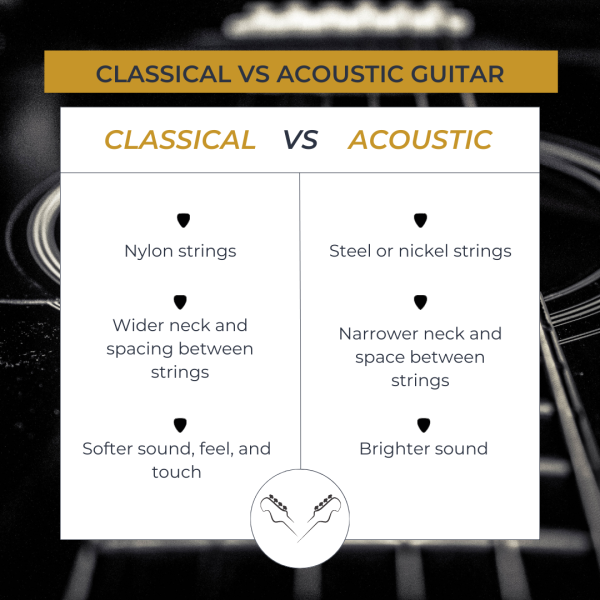No, the style he plays is not acoustic, nor is it electric. Junior Aidan Williams plays classical guitar, a style of the instrument centered around tone and precision. The sound of classical guitar sounds close to that of harpsichord: rich and light, capable of intricate melodies.
For his first five years on the instrument, Williams played mostly electric guitar before his teacher introduced him to some classical pieces.
“My teachers just gave me a few pieces and I enjoyed playing them and spent more time practicing,” he said.
As the minutes turned to hours on the instrument, Williams quickly realized his love for the style, even switching teachers to focus on classical fully.

Although acoustic and classical guitar may sound and look similar, key differences make the two styles distinct. Firstly, the actual body of the instrument is different. At first glance, the body of the guitar looks similar, but a few defining features make the instrument produce a softer and sweeter sound.
“It [classical guitar] has nylon strings, the fingerboard is slightly wider, and the strings are slightly higher off the fretboard,” Williams said.
The physicality of the instrument allows the style of classical guitar to sound distinct and differ from other versions of guitar.
“You’re focusing on tone, tone production and there’s a lot more nuance to it than electric,” Williams said. “The sound is different.”
You’re focusing on tone, tone production and there’s a lot more nuance to it than electric
— Aidan Williams
Nuance changes practicing habits, and Williams makes adjustments to his day-to-day life to aid his study of classical guitar.
“I have to grow my nails out for better tone. On electric, it doesn’t work as well. They kinda stick to the string,” Williams said.
Soon after starting classical guitar, Williams broke his arm, leaving him unable to play.
“I had to take a break for a while. Capricho Arabe was the piece I focused on to get back into it. It helped me engage back with my instrument,” Williams said.
Williams credits his arm break, usually quite the pain for musicians, with allowing him to discover his love for classical guitar. His broken arm prevented him from picking up the guitar, and his sense of loss made him realize the love he had for playing. When he was able to play again, he dove in with more passion and ambition than before.
Classical guitar is a diverse genre, with its canon hailing from across the world. Williams plays pieces by a variety of composers, but often by Agustín Barrios, an essential author of the classical guitar repertoire—the composer of over 300 works.
“I play stuff from the composer Barrios; he is Paraguyan [and his music is] from the early 1900s. And [ I play music from] Spanish composers as well,” Williams said.
Playing guitar is a daily practice for Williams, serving as a de-stressor among the pile of things to do. Plucking the nylon strings gives him mental free space to do something non-academic and turn his energy towards creating art.
“I probably spend most of my free time practicing,” Williams said, “It’s kind of an icebreaker if I am stressed or whatever, taking a break from homework to focus on music.”
In March, Williams will enter a competition at Macalester College in which he will play two pieces of different styles and receive a 30-minute feedback session with a judge. This is the first competition Williams has entered in his years playing classical guitar.
Williams also sees guitar further into his future, into college and beyond.
“I was thinking of doing a minor in music in college…my performing ability isn’t great but I want to be able to work on that and perform at venues in the future.”
Classical guitar isn’t something that comes and goes for Williams; it is a daily habit, a calming agent, and a deep curiosity of his.